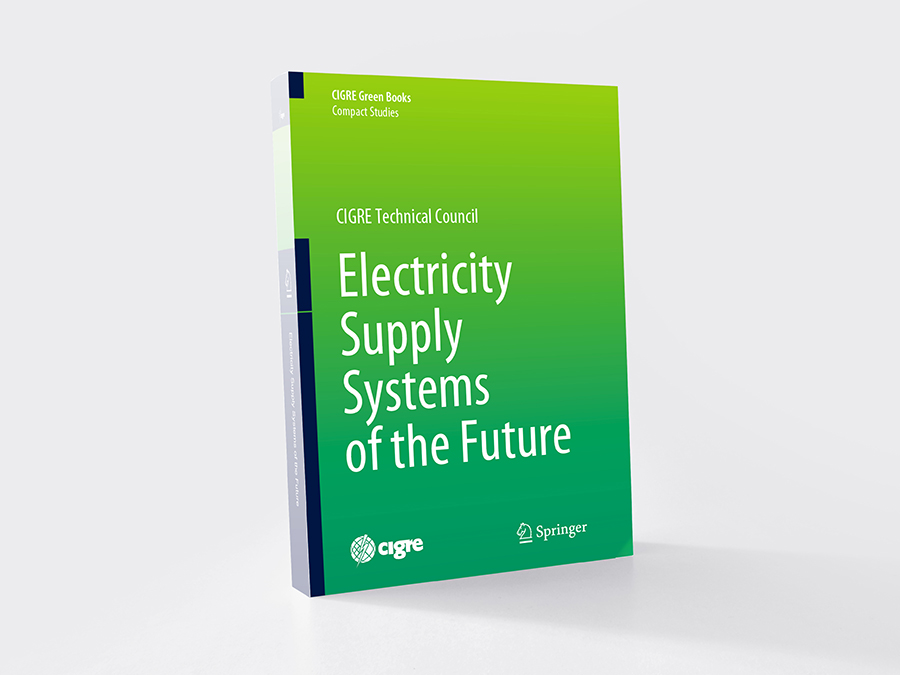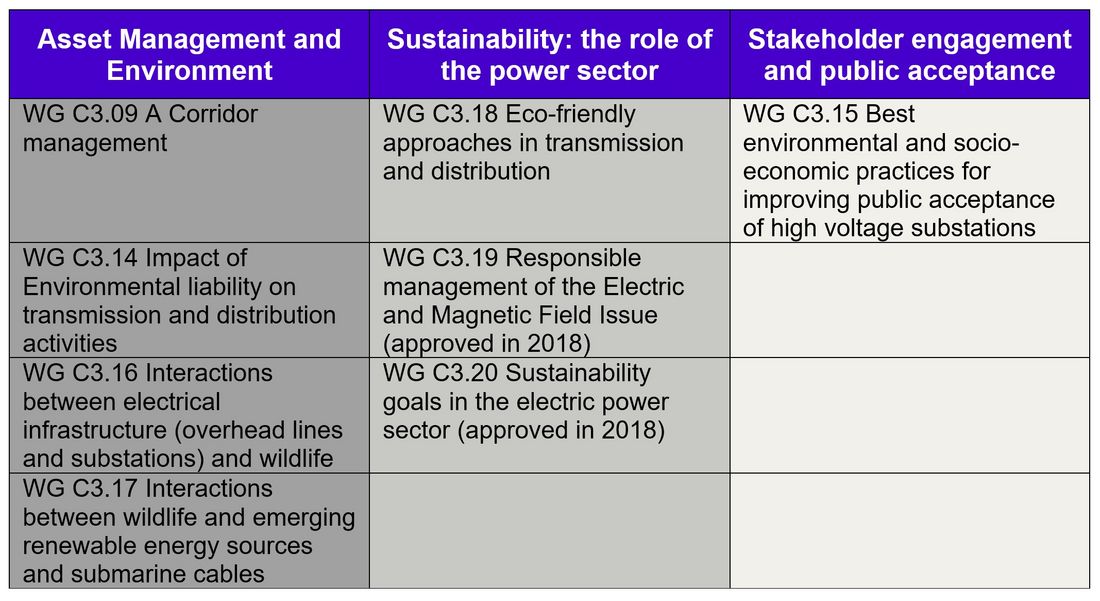Power system environmental performance
by Henk Sanders, Chair & Mercedes Vázquez, Secretary
and Flavia Serran, new Chair, & César Batista, new Secretary since August 2020
Overview of the Study Committee C3
SC C3 was created in 2002, with the main mission to present unbiased positions and produce approaches on power system environmental performances and impacts and their implications for management, construction, operation and investment decisions. Since 2018, SC3 developed a new Strategic Plan. The final version has been approved in the last SC meeting, in Aalborg (2019). Main modification was the inclusion of a focus on “Sustainability”, that is now included in one of our Technical Directions (TD). This new focus shows the aim of the SC3 to focus on sustainability aspects and the increasing relevance of the concept within CIGRE.

Technical directions SC C3
Including Sustainability as one of the focus brings to light broader aspects regarding social aspects. Sustainable Developments Goals defined by the United Nations, include Affordable and Clean Energy (SDS#7) as one of the goals to be achieved by 2030. Therefore, the work conducted by CIGRE SC C3 members involves the environmental and social issues related to power system planning and to components and sub-system design and operation, focusing on “system” aspects. This work can only be developed with good communication and co-operation with the other SCs.
2019 Highlights
The SC C3 continues to improve its presence and activity within CIGRE. As environmental and social issues have interactions with almost all aspects of power systems, SC C3 is constantly developing efforts to maintain and increase good communication and co-operation with the other SCs. The highlights of this year are the following:
- SC C3 has been involved in two Green Books: Green Book about asset management and Green Book about the Electricity supply systems of the future;
- SC3 is involved in the Africa project (collaboration between CIGRE and the WorldBank);
- C3.01 has formally changed into Advisory Group EMF SC C3.01: Electromagnetic fields and health;
- SC C3 has collaboration with SC B1, B2 and B3 through designated ambassadors. This experience has been observed to work quite well increasing interaction among SCs;
- SC C3 launched its second tutorial, about the work of JWG C3/B1/B2 “Environmental issues of high voltage lines in urban and rural areas”. This was presented by the Convenor of this JWG, Hector Pearson for the first time in Aalborg Symposium 2019;
- Webinar about the work of C3.19: Responsible management of the electric and magnetic field issue was given by the convenor James Hart.
Due to the COVID19 pandemic and the need for everyone to take care of each other and be safe, some of our 2020 activities had to be adapted. The Paris session 2020 was modified to a digital meeting and the physical meeting was transferred to 2021 when will have our Centennial meeting in Paris. Our next SC C3 meeting will be held on line and we are developing efforts to organize everything to have a fruitful meeting.
With the same objective, the ERIAC meeting that was going to be held in Argentina in 2021 was also postponed for 2023. Therefore, SC C3 will not meet in Argentina in 2021 as planned. Our 2021 meeting will be during the Centennial Session, in Paris, in 2021.

The Green Book is available for purchase on our partner's website Springer.
If you are a CIGRE Member, please contact us to benefit from a 40% discount on your purchase.
Workstreams
SC C3 has 28 regular members (including the Chairman and the Secretary) and 11 observers representing 30 countries. Since last annual report, SC C3 increase the presence of different countries from 24 to 30.
Currently SC C3 has the Strategic Advisory Group (SAG) in place, comprising six professionals aiming to represent the diversity of C3 members, including gender, continents and type of institutions. There are also 12 active Working Groups, three of them approved in 2019 (WG C3.21, WG C3.22 & WG C3-23).
The aim of the SC C3 is to start new Wrking Groups every year.
New Working Groups
New Working Groups, approved in 2019 that will begin in 2020 are:
- C3.21: Including stakeholders in the investment planning process (Renewed TOR of former JWGC1/C3.31)
- C3.22: Vegetation management in substations
- C3.23: Eco-design methods for TSOs/DSOs under environmental transition
Ongoing Working Groups
C3.09A: Corridor management
This WG was disbanded for a few years but TB or articles had not been published. With the aim to finish the publications, the TOR of the group has been reviewed and a new version of the group (C3.09A) has started to work, with some old and new members. The intention of the WG is to collect information and compare regulation, procedures, methods and best practices from different countries that apply to relations with landowners and environmental aspects of corridor management.
WG C3.14: Impact of Environmental liability on transmission and distribution activities
The aim of the WG is to create a reference document to enable T&D utilities to understand the possible impact (practical and financial) of environmental liability and to have a view on best practices regarding prevention, investigation and remediation of environmental damage. The works are expected to be finished soon.
WG C3.15: Best environmental and socio-economic practices for improving public acceptance of high voltage substations
The Working Group aims to make an inventory of the best practices, options, and boundary conditions for the integration of substations in their environment. The resulting Brochure intends to be an international reference document to be used in the discussion with other stakeholders. It shall help to identify workable solutions from environmental and socio-economic perspectives and increase acceptance by local authorities.
WG C3.16: Interactions between electrical infrastructure (overhead lines and substations) and wildlife
The objective of the Working Group is to gather knowledge and best practices about interactions between electrical infrastructure and wildlife. The scope is so broad that a new group has been created and WG C3.17: Interactions between wildlife and emerging renewable energy sources and submarine cables. WG C3.16 is focused in OHL and substations dealing with all the aspects of the grid lifetime and WG C3-17 will address renewable projects and associated transmission systems, focusing on operational aspects, though construction impacts will also be considered.
WG C3.18 Eco-friendly approaches in transmission and distribution
The scope of the work is to focus on eco-friendly approaches in electricity transmission and distribution that require extra funds. It will identify the incentives and disincentives for such approaches faced by companies for such approaches, related to regulatory and other drivers as well as good practices in dealing with external influences.
WG C3.19: Responsible management of the Electric and Magnetic Field Issue
In 2017, the CIGRE Working Group C3.01 concluded that considering that electric and magnetic fields have been extensively studied worldwide, a causal relationship with any health outcome is very unlikely. Nevertheless, while the evidence falls short of establishing any adverse health effects, EMF can be significant influencing factor for new projects. The subject requires consistent, open and responsible management in order to avoid serious implications for business. The goal of the group is to provide accurate, consistent, industry-wide information for guidance to the electricity distribution and transmission industry to address the EMF issue. This Technical Brochure is conclude and it is already published on e-cigre.
WG C3.20: Sustainable development goals in the electric power sector
Approved in 2018, the general aim of the WG is to develop recommendations on how the electric power sector should implement SDGs within their business strategies in order to reach a maximum contribution to the achievement of these goals.
Ongoing Working Groups as per the Technical directions

And finally, WG C3.12A : Greenhouse Gas Emissions inventory and report for transmission system operators (Re-start), that is currently in the approval process. The purpose of the WG was to review and recommend harmonized procedures and methods for accounting and reporting GHG emissions that can be used by TSO’s worldwide.
And finally, WG C3.12A : Greenhouse Gas Emissions inventory and report for transmission system operators (Re-start), that is currently in the approval process. The purpose of the WG was to review and recommend harmonized procedures and methods for accounting and reporting GHG emissions that can be used by TSO’s worldwide.
And finally, WG C3.12A : Greenhouse Gas Emissions inventory and report for transmission system operators (Re-start), that is currently in the approval process. The purpose of the WG was to review and recommend harmonized procedures and methods for accounting and reporting GHG emissions that can be used by TSO’s worldwide.
Events
In 2019 SC C3 participate in the organization, in June 2019, jointly with the CIGRE Danish National Committee, SC C4, SC C1, SC C2, SC C6, SC B2, SC B4 and the Aalborg University the Symposium “Going offshore – challenge of the future power grid". The Tutorial Line Routing in Urban and Rural Areas was presented. The SC C3 Session discussed the Eco-design and environmental concerns, the social aspects (people). Five main issues were presented and discussed comprising new design for structures, recommended practices for safety, environmental regulations regarding new electrical installations, how to improve public participation and an experience in how to create a safety culture of “better together” and cooperation among employers, contractors and subcontractors. SC C3 was also involved in a discussion meeting with very interesting papers. The lessons learned from this event can be summarised as follows:
- Engagement of people (externally and internally) is crucial for being successful in all the challenges that the power sector is facing;
- Objectives from public is still one of the major problems our sector faces. Today we saw several ideas to improve public acceptance: from taking care of safety of all our workers to measurements for improving visual impact and from new methods for reducing environmental effects to the use of modern communication techniques;
- The importance of sharing also the failures/bad examples;
- Shortage of accurate data (bird collision and mammals);
- Working with SDG’s is helping on organizing and structuring the approach from the sector;
- The objectives that is set by national plans is creating pressure in the sector, there is a gap between the politics want and what the sector can deliver;
- Sharing is a major key factor for our future work (e.g. Information with stakeholders in early stage, multipurpose platforms).
Conclusions
SC C3 will continue working to improve and increase its contribution to CIGRE activities, with the aim to include the electric systems in the contemporary challenges of the efficient use of the planet natural resources, taking into account a balance of economic, social and ecological functions. If, in the past, these challenges were considered as ideals or abstract goals for a distant future, the international community nowadays considers these goals as concrete and immediate concerns. The financial sector is increasingly considers environmental and social criteria and standards in their investment strategies. Therefore, the environmental and social performance, the focus of SC C3 work, contributes in a way that its members, companies and other professionals involved with the electric systems to insert its daily and routine activities in an overall context of challenges and achievements of our society.
We are very grateful for all SC C3 members work and for the partnership and support of other SC and CIGRE. Thanks!
